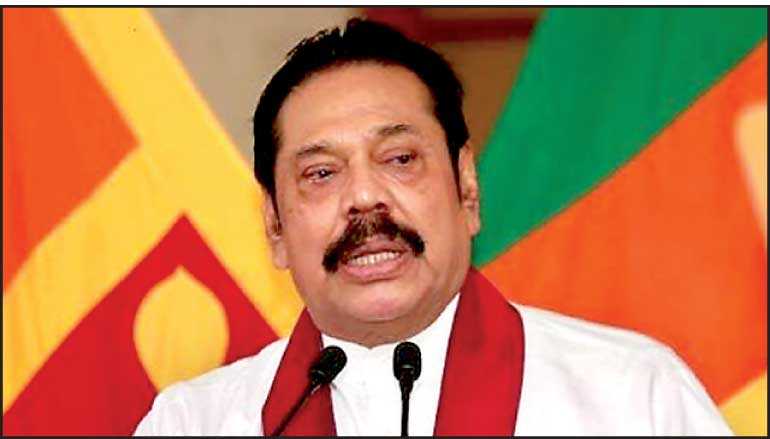Wednesday Feb 18, 2026
Wednesday Feb 18, 2026
Monday, 11 May 2020 00:09 - - {{hitsCtrl.values.hits}}

Prime Minister Mahinda Rajapaksa
Prime Minister Mahinda Rajapaksa yesterday called for public support to gradually restore normalcy to the country and said it is necessary to keep in mind that COVID-19 has been controlled to a “satisfactory degree” but not eradicated.
Issuing a statement ahead of the easing of restrictions today, the Prime Minister claimed Sri Lanka had begun COVID-19 countering measures “quite early” and were therefore able to keep infections and deaths to a minimum.
“The people fully cooperated with the efforts made to bring the spread of COVID-19 under control. We request the people to extend their fullest cooperation once again to the armed forces and Police for the phased restoration of normal life in the country.”
He also praised the leadership of President Gotabaya Rajapaksa, as well as the armed forces and health services in working together to successfully control the spread of the virus.
“Sri Lanka began preparations for this pandemic quite early. The President set up a task force to combat COVID-19 as early as 26 January. Even though there were no COVID-19 patients in Sri Lanka at that time, the first quarantine centre was declared in Hendala on 4 March. The first COVID-19 patient was discovered on the night of 10 March. From 11 March, all passengers coming into Sri Lanka from COVID-19-affected countries were quarantined. As the armed forces and Police carried out an effective contact-tracing program to identify those who had come into contact with patients, this disease has now been brought under control to a satisfactory degree,” the statement said.
Rajapaksa added that at this moment, Sri Lanka is well ahead of most countries in the world in terms of controlling the spread of COVID-19. This was due to Sri Lanka’s doctors, nurses and other medical personnel, and intelligence services who maintained a very effective contact-tracing operation, as well as the armed forces, Police, public health inspectors and others who played a frontline role in working directly with the public.
“We should be proud of what they have achieved. It’s noteworthy that while 25 Sri Lankans resident in Britain have died due to COVID-19, only nine Sri Lankans resident in Sri Lanka have died of this disease so far. It must also be stated that had Gotabhaya Rajapaksa not been elected President on 16 November last year, none of these achievements would have been possible.”
With the COVID-19 outbreak now under control to a certain degree, the Government has gradually begun relaxing the curfew, Rajapaksa said. He observed that even though steps were taken to impose curfew and to shut down the country, in reality, no country could be shut down completely; and while the majority of the people were confined to their homes, millions of others continued to work throughout the country.
The health services, armed forces, Police, paddy farmers, vegetable farmers, fishermen, distributors of food, medicine and other essentials, and even some factories continued to function. What is meant by restoring normalcy to the country is the process of extending this state of affairs in a controlled way to the section of the population that had been confined to their homes during the shutdown.
“At the outset, government and private sector institutions will begin functioning with a limited number of employees. The number of passengers on trains and buses will be limited. Schools and tuition classes will remain closed. Social distancing rules are to be maintained when commencing work in this phased manner. At the early stages, when curfew was relaxed in certain districts, people did not observe social distancing regulations.”
However after a while, people became more mindful of the need for social distancing in public places. The public should continue to be mindful of the need for social distancing even after the curfew is relaxed. The public should all be aware that even though the spread of COVID-19 has been brought under control, it has not been eradicated completely, Rajapaksa warned.
“Random sample testing among members of the public will continue to be carried out. The quarantine centres will be kept open. Even after the restoration of normalcy has begun, it may be necessary to isolate and lock down certain areas and even to impose police curfews. COVID-19 patients may continue to be found, but I believe our health authorities have by now mastered the manner in which such situations should be handled.”
“We will have to maintain a balance between steps taken to prevent the spread of the disease on the one hand and the restoration of normalcy on the other. Even countries like Italy, Britain, France and the USA, which experienced tens of thousands of COVID-19-related deaths, have now commenced programs for the gradual restoration of normal life.”